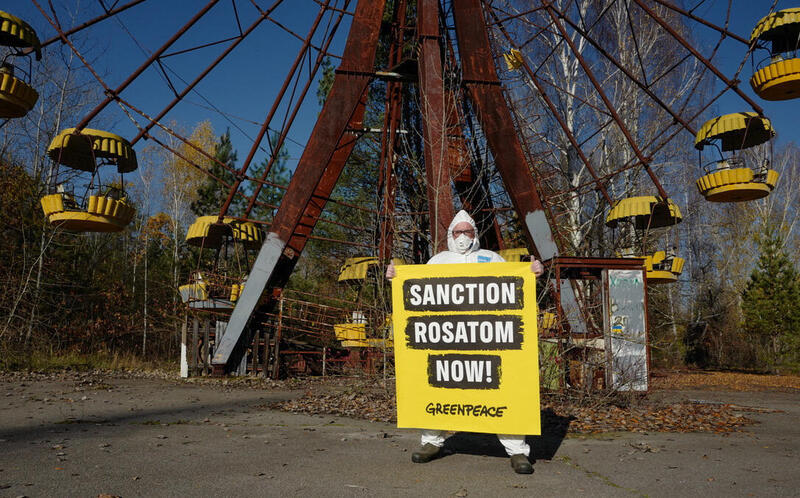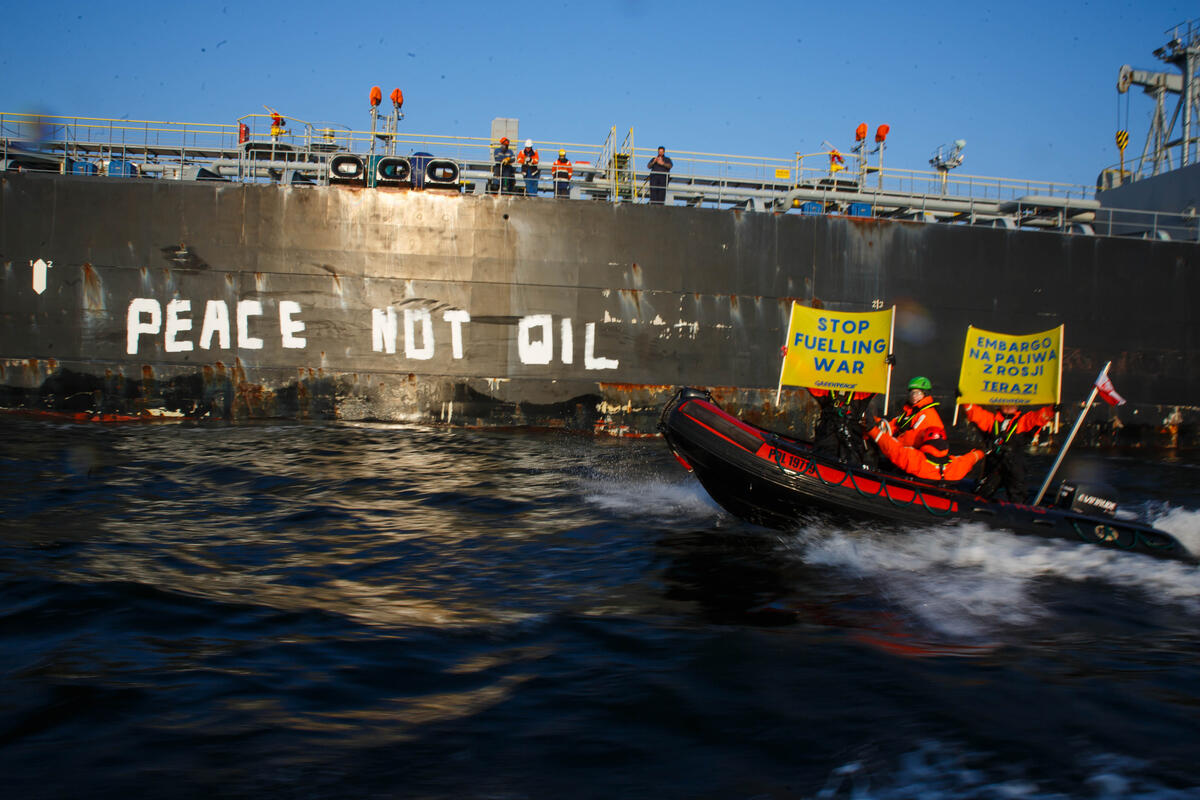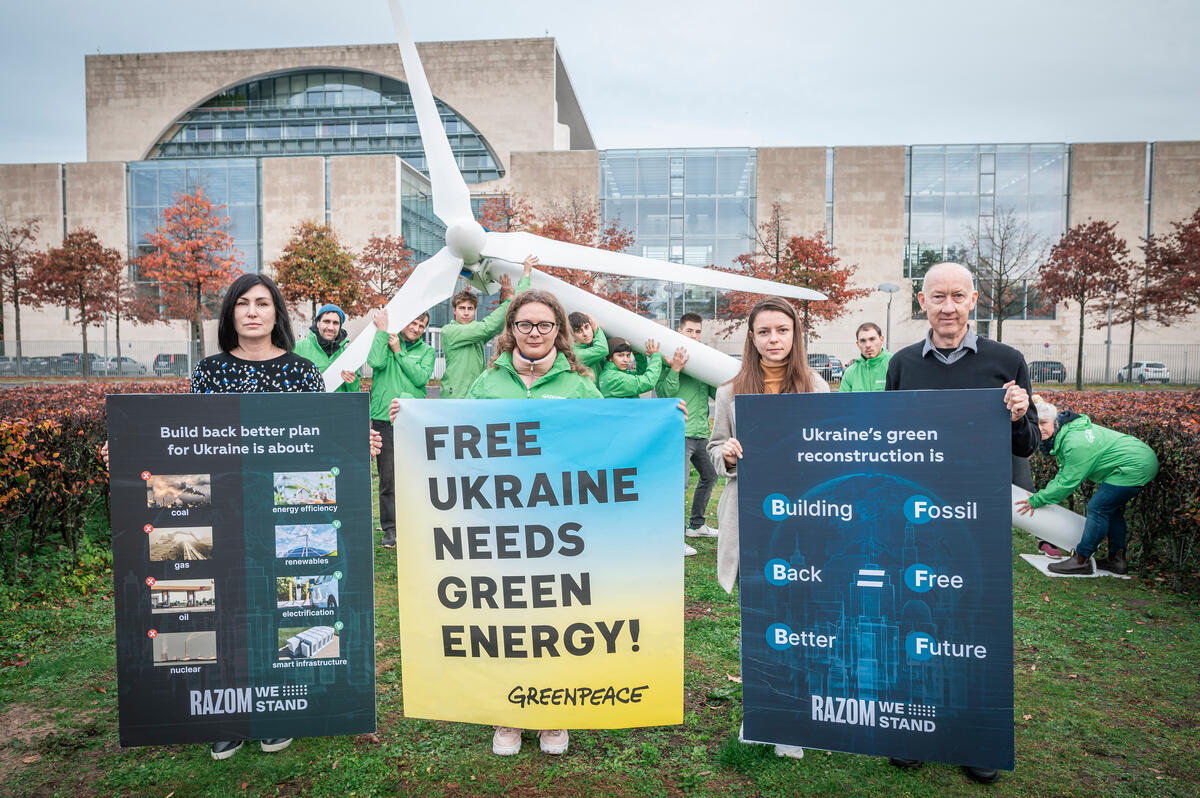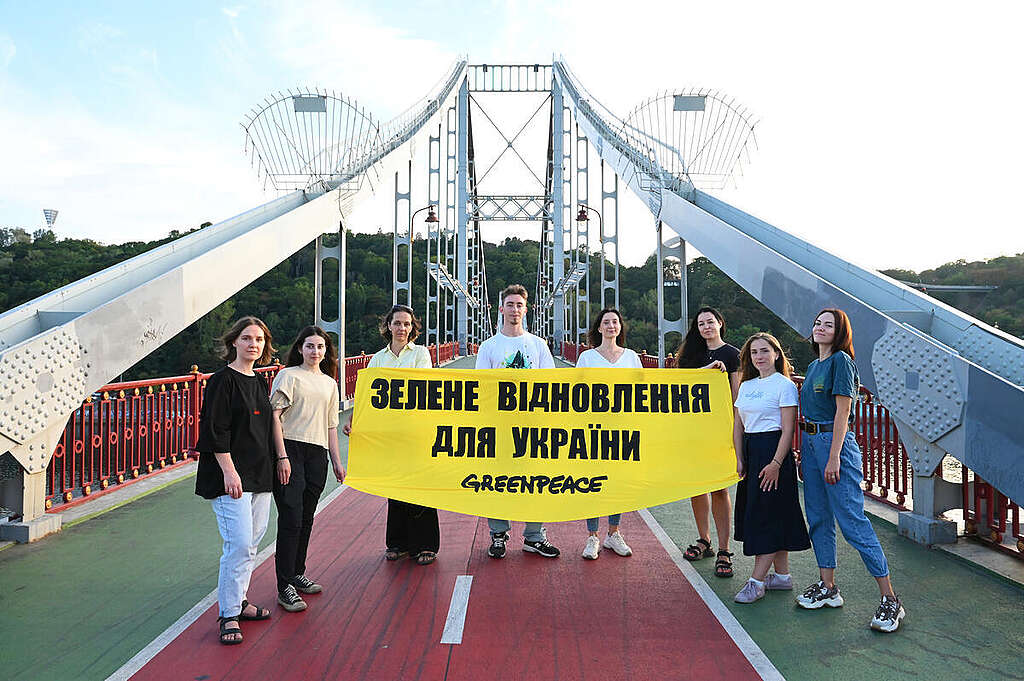The Greenpeace Ukraine team writes this blog on the third anniversary of Russia's full-scale invasion of Ukraine with a terrible sense of déjà vu.
Three years ago we woke up to explosions, the noise of aircraft and alarmed calls from relatives. Russia started a full-scale invasion of Ukraine. The news came in waves, making it difficult for us to follow the updates. But, each of us remembers being especially shocked by the news of the occupation of the Chornobyl nuclear power plant by the Russian armed forces.
For Ukrainians, Chornobyl is not just about terrible memories of the greatest nuclear tragedy in the world. Chornobyl remains a symbol of society's vulnerability to lies and irresponsible decisions by the authorities.

Playing with fire: How Russia wields nuclear risk as a weapon of war
On 24 February 2022, we saw how the "peaceful atom" can be used to blackmail the whole world. In a few days, the nuclear dictatorship gained momentum - the Russian occupiers seized the Zaporizhzhia Nuclear Power Plant (ZNPP) where they remain today. Thanks to the resistance of the Ukrainian people and the efforts of the Ukrainian army, in the spring of 2022, the Chornobyl nuclear power plant was liberated from Russian occupation. The people of Mykolaiv also prevented the Russian attack and occupation of the South Ukraine nuclear plants.
Three years later, Russia again attacked Chornobyl. On February 14, the Russian military detonated a drone with a high-explosive warhead at an altitude of 85 meters, damaging the New Confinement Shelter (NSC), that protects the tragically famous 4th reactor. The explosion penetrated the outer roof of the NSC and the inner containment shell, causing a fire that Ukrainian rescuers are still fighting. The drone's flight altitude was deliberately chosen so that it would not be visible to radar. This was no accident.
Why is a new attack on Chornobyl symbolic of the time we are at in modern history? Russia is trying to assert control over the future war negotiations and to secure permanent control over the ZNPP by showing it is prepared to attack nuclear plants, even Chornobyl. By showing it has a complete disregard for nuclear safety. Their aim is to frighten the world into conceding all to Moscow.
We are convinced that there is so much more the international community could do to put pressure on Russia to end this bloody war in the heart of Europe. Existing sanctions are riddled with gaps and loopholes, allowing Russia to continue profiting and financing its war machine. A highly lucrative trade persists between European and Russian nuclear companies, who willingly collaborate with those complicit in war crimes. Russian fossil fuels-oil and gas-are still being exported with the involvement of European companies. The ongoing cooperation with Russian businesses, despite Rosatom and the Russian armed forces committing atrocities against the people and environment of Ukraine, must be brought to an end.

Stopping and deterring future Russian aggression: four urgent demands for world leaders
Events are unfolding rapidly not only in Ukraine but across the world. Stopping Russian aggression and preventing new security threats requires decisive, comprehensive action.
Greenpeace Ukraine has four urgent demands for world leaders - issues our organisation has championed for years but which can no longer be delayed. These critical steps are essential to ending and deterring future Russian aggression. Our focus is on the acceleration of renewable energy sources, security from nuclear danger in Ukraine and globally, and cutting off the revenue streams that fuel Russia's war, devastating Ukraine's environment while enabling conflict, suffering, and loss of life.
1. We call on the international community to invest in renewable energy in Ukraine. Greenpeace Ukraine also urges the Ukrainian government to prioritise decentralised solar energy development. Solar power has already proven to be a reliable source of electricity during outages, even in winter, and must play a key role in building a resilient and sustainable energy future in Ukraine's reconstruction.
2. We demand the inclusion of the entire Russian shadow fleet in the next EU sanctions package. The Shadow Fleet profits from oil exports, which finance the war, and poses a high risk of oil spills in European seas. We also demand EU sanctions on Russian liquefied natural gas (LNG), which also finances the war and contributes to climate change.
3. We demand that Russia be prevented from restarting the Zaporizhzhia Nuclear Power Plant (ZNPP), and that the International Atomic Energy Agency (IAEA) provide no support for its restart. And that all international efforts are made to secure the earliest Russian de-occupation of ZNPP, including during negotiations to end the war, and for full control of the nuclear plant restored to Ukraine.
4. We demand the imposition of comprehensive sanctions on the Russian nuclear corporation Rosatom and the immediate termination of all relations with this criminal organisation, which is responsible for the occupation of both the Chornobyl and Zaporizhzhia NPP.

The Greenpeace Ukraine team firmly believes that large-scale decentralised solar energy development is the best response to the energy crisis and the key to Ukraine's resilience and independence.
The current target for new solar installations in Ukraine's 2024 Plan is too low-only +0.7 GW in total by 2027. The Ukrainian government must prioritise decentralised solar energy development and set significantly more ambitious goals for solar energy expansion.
Due to relentless Russian strikes, over 85% of thermal power plant capacity and 50% of hydroelectric capacity have been lost, while nearly 45% of nuclear capacity remains unusable due to Russian occupation at the ZNPP. With the energy system under constant attack and on the verge of collapse-mirrored by the heating sector's struggles-deploying small decentralised hybrid solar power plants alongside existing municipal solar installations is crucial for strengthening Ukraine's resilience and to keeping the lights on in these difficult times.
Investing in new nuclear plants is a dangerous distraction. It is costly, slow to deliver, and undermines the growth of renewables while creating new targets for potential future Russian aggression. Nuclear power does not provide energy security-it only brings expensive electricity and increased risks.

We appeal to all leaders to properly understand Russia's nuclear threats, mobilise forces and stand together for a clean and secure future of Ukraine and Europe where democracy and freedom prevails.
As we mark the third anniversary of this devastating war, the demands of the Greenpeace Ukraine team represent only the beginning of what must be done to secure a just and lasting peace for Ukraine.
The road ahead is long, but the need for action is immediate and clear. Together, we can rise to the challenge, help bring an end to this devastating war and forge a path towards a just peace and green reconstruction in Ukraine.
Natalia Gozak is office director for Greenpeace Ukraine. Daryna Rogachuk is communications officer for Greenpeace Ukraine.






